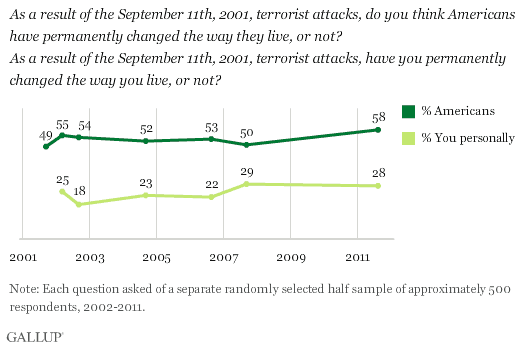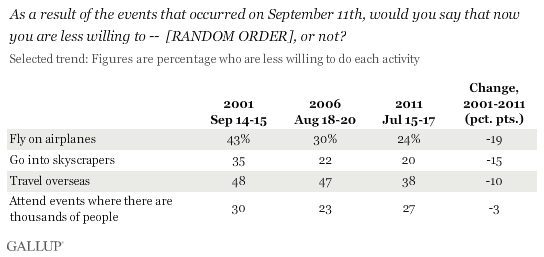PRINCETON, NJ - Ten years after the 9/11 terror attacks, 28% of Americans say they have permanently changed the way they live as a result of that tragedy. More, 58%, believe that Americans overall have permanently changed the way they live.

These results are based on an Aug. 11-14 USA Today/Gallup poll. Gallup has asked these questions periodically since 2002 and has found a similar divide between perceptions of how the attacks have affected Americans in general versus how they have affected respondents personally.
While one might expect the passage of time to lessen Americans' perceptions of the effects of 9/11 on the country or on their own lives, that has not been the case. In fact, Americans are now slightly more likely than in the past to think Americans' lives and their own lives have permanently changed.
Neither question shows much variation by subgroup. However, women (33%) are more likely than men (23%) to say they have permanently changed the way they live. Also, those in the East (71%) are more likely than those in other regions of the country to think Americans have changed the way they live (59% in the West, 54% in the Midwest, and 50% in the South).
Americans Now Less Reluctant to Fly, Travel Overseas, and Go Into Skyscrapers
Substantial minorities of Americans in a separate USA Today/Gallup poll, conducted July 15-17, say they are now less willing to travel overseas (38%), attend events where there are thousands of people (27%), fly on airplanes (24%), or go into skyscrapers (20%) as a result of the 9/11 terror attacks.
The effects of time are apparent on these measures, as Americans' reluctance is significantly lower on three of the items now than in the immediate aftermath of the attacks, including a 19-percentage-point decrease in the percentage saying they are less willing to fly.

These data do not necessarily speak to how actual behavior may have changed since 9/11. It is possible that many people who say they are "less willing" to engage in these activities are unlikely to do them in any case, or that some who are less willing to do certain activities still do them in certain circumstances.
Gallup periodically asks Americans about their air travel habits. In Gallup's last update prior to 9/11, from August 2000, 45% of Americans reported having flown in the prior 12 months, with the average American taking 1.8 round trips. In the most recent update of this trend, from December 2008, the percentage who traveled by air was 43%, with an average of 1.7 round trips per American. Between August 2000 and December 2008, there have been fluctuations in the percentage of Americans flying, but nothing to suggest a sustained decrease in air travel -- even as one in four Americans continue to say they are less willing to fly because of 9/11.
Implications
The 9/11 terror attacks will certainly rank among the most significant events in U.S. history. Currently, 58% of Americans believe the attacks fundamentally altered the way people in this country live their lives, while a smaller 28% say they have permanently changed the way they live. In the 10 years since the attacks, however, there has been no decrease in the percentage of Americans who say they have permanently changed the way they live their own lives.
One thing that has changed in the last 10 years is that Americans are less likely to express reluctance to engage in activities that could make them vulnerable to terrorist attacks, including flying, traveling overseas, and going into skyscrapers. However, substantial minorities of Americans maintain they are less willing to do these things than they were before the attacks occurred, though the extent to which Americans have actually cut back in these areas remains unclear.
Results for this USA Today/Gallup poll are based on telephone interviews conducted July 15-17 and Aug. 11-14, 2011, with random samples of approximately 1,000 adults, aged 18 and older, living in all 50 U.S. states and the District of Columbia.
For results based on the total sample of national adults, one can say with 95% confidence that the maximum margin of sampling error is ±4 percentage points.
Interviews are conducted with respondents on landline telephones and cellular phones, with interviews conducted in Spanish for respondents who are primarily Spanish-speaking. Each sample includes a minimum quota of 400 cell phone respondents and 600 landline respondents per 1,000 national adults, with additional minimum quotas among landline respondents by region. Landline telephone numbers are chosen at random among listed telephone numbers. Cell phones numbers are selected using random digit dial methods. Landline respondents are chosen at random within each household on the basis of which member had the most recent birthday.
Samples are weighted by gender, age, race, Hispanic ethnicity, education, region, adults in the household, and phone status (cell phone-only/landline only/both, cell phone mostly, and having an unlisted landline number). Demographic weighting targets are based on the March 2010 Current Population Survey figures for the aged 18 and older non-institutionalized population living in U.S. telephone households. All reported margins of sampling error include the computed design effects for weighting and sample design.
In addition to sampling error, question wording and practical difficulties in conducting surveys can introduce error or bias into the findings of public opinion polls.
View methodology, full question results, and trend data.
For more details on Gallup's polling methodology, visit www.gallup.com.
